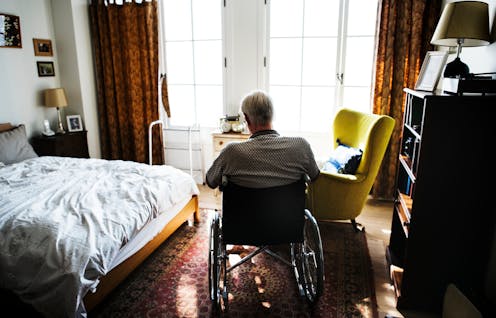Voluntary assisted dying is legal in Victoria, but you may not be able to access it
- Written by The Conversation

Voluntary assisted dying is legal in five Australian states with the sixth, New South Wales, following in November 2023. The territories are now permitted to legalise voluntary assisted dying, with the Australian Capital Territory intending to do so by the end of 2023.
Victoria was the first state to implement voluntary assisted dying in 2019. After four years, its legislation requires a formal review. Western Australia’s legislation, which started in 2021, requires a review after just two years. Both reviews are due to start soon.
Patients’ experiences of seeking voluntary assisted dying will be central to these reviews. In today’s Medical Journal of Australia, we report on the first study of patients’ voluntary assisted dying experiences in Victoria, as described in interviews with family caregivers.
We found five key barriers to accessing voluntary assisted dying in Victoria.
First, patients had difficulty finding doctors willing and qualified to assess eligibility for voluntary assisted dying.
Second, the voluntary assisted dying application process often took a long time and sometimes delays occurred. This was especially hard for very sick patients who had little time left.
Third, some hospitals, aged care facilities and other health-care institutions objected to being involved in voluntary assisted dying. Often, patients could not be assessed for voluntary assisted dying in these facilities, nor receive or take the voluntary assisted dying medication there.
The final two barriers were legal ones. The Victorian law prohibits health practitioners from raising voluntary assisted dying with patients. Patients needed to know they had to be the one to ask about voluntary assisted dying.
Legal concerns also mean health practitioners in Victoria cannot use telehealth for voluntary assisted dying consultations. This required some patients to travel to appointments, sometimes over great distances, causing pain, distress and hardship.
These five barriers meant patients were sometimes unsure about how to seek voluntary assisted dying and where to get information. They also caused suffering for patients and families, and led to delays in accessing voluntary assisted dying.
Access was more difficult for people in regional areas or with neurodegenerative conditions, such as motor neurone disease.
Who provides help and support?
Statewide voluntary assisted dying care navigators are government-funded health professionals who help patients navigate the system. Some hospitals and health services also appointed local voluntary assisted dying coordinators. Described as the “jewel in the crown”, their guidance was especially helpful when patients started the voluntary assisted dying process and were unsure what to do.
Finding a supportive doctor willing and qualified to assess eligibility for voluntary assisted dying was often a turning point for patients. But this sometimes depended on luck.
The statewide pharmacy service’s education and support when providing the voluntary assisted dying medication was very reassuring for patients and families.
These facilitators helped patients navigate a complex and rigorous voluntary assisted dying assessment process and to feel more supported and confident. Participants repeatedly commended the commitment and compassion of doctors, navigators and pharmacists.
Aside from some logistical challenges in the system’s early days (which improved over time), once patients contacted a willing doctor or navigator they generally felt well-supported.
How can voluntary assisted dying systems be improved?
We propose the following steps to improve patient access:
ensure patients have clear and readily available information about voluntary assisted dying so they can make earlier contact with care navigators
encourage more doctors to be involved, including by offering adequate remuneration
require doctors who don’t want to provide voluntary assisted dying to refer patients to a willing doctor, or provide navigators’ contact details
allow doctors to raise voluntary assisted dying as an option and to use telehealth when appropriate
regulate objections by institutions so access to voluntary assisted dying is not blocked
adequately resource and support integral system roles including navigators and the statewide pharmacy service.
A safe system that allows only patients who meet the strict eligibility criteria to choose voluntary assisted dying is critical. However, our research shows significant barriers impede access and limit choice.
Some of these barriers are specific to Victorian law, such as doctors not being able to raise voluntary assisted dying. But others, such as limits on using telehealth, have implications for the rest of Australia.
For states reviewing their system, and jurisdictions implementing voluntary assisted dying or considering passing laws permitting it, access must be an important consideration too.
Read more: What happens if you want access to voluntary assisted dying but your nursing home won't let you?
A summary of our research is available here. Information about contacting voluntary assisted dying care navigators in your state is available here.







